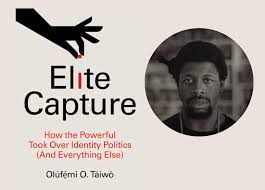Elite Capture and Value Capture
Elite Capture: How the Powerful Took Over Identity Politics (And Everything Else), Olufemi O Taiwo, 2022
In democracies, ostensibly, the elites (policymakers) are put in office by the non-elites (citizens), who can remove and replace them if they fail to defend public interests. Much like the mythical market, mythical liberal democracy is supposed to be self-correcting and self-justifying by definition. This way of casting the conversation about power and governance has been integral to the framing that links “freedom” and “capitalism” in the ideals and practices of liberal democracy: a country’s freedom need only be found at its ballot boxes rather than in, say its workplaces. Thus, if one believes in liberal democracy, they may believe that imbalances of power everywhere could be fixed by instituting arrangements like the “rules-based international order,”democratic elections,” and “formal political representation.” In a nutshell, if the right ideals are embodied in the right formal systems, then the outcomes of those systems are justified.
Ronald Reagan’s 1986 Anti-Drug Abuse Act, which helped supercharge mass incarceration by establishing mandatory minimum sentencing guidelines and adding $1.7 billion toward the drug war, while welfare programs were cut…The consequences led Democratic senator Daniel Patrick Moyniham to make a striking appraisal: “If we blame crime on crack, our politicians are off the hook. Forgotten are failed schools, the malign welfare programs, the desolate neighborhoods, the wasted years. Only crack is to blame. One is tempted to think that if crack did not exist, someone, somewhere would have received a federal grant to develop it.”
And then there’s capital. The 1950’s and 60’s saw important innovations in corporate management (particularly in the United States, which stood comfortably atop the post-World War II global economy):leveraged buyouts, divestitures, mergers, major sell-offs of “non-core businesses,” and other forms of reorganization of business by profit-hungry shareholders. These trends intensified in the 1980’s, producing what researchers called the “shareholder revolution”: a proliferation of management techniques that put previously complacent industry managers under strict discipline of activist shareholders. This second phase of shareholder revolution coincided with and helped produce a larger “global business revolution,” a “fast-developing process of concentration at a global level in numerous industries supplying goods and services,” to “system integrators”–the few large firms who can reorganize global production around their “core” business models and assets.
These institutions emerged as the world order was being reconstructed in the waning years of Second World War, with the United States newly emergent as a global hegemon. The architects met in Bretton Woods, New Hampshire, where they set up the International Monetary Fund (IMF) and what later became the World Bank. Whatever the “narrow” technical pretensions of their mandates, these organizations in fact have immense governing powers. They offer aid packages that are conditional on certain governance decisions by the receiving country – decisions that help determine the availability of jobs, public services, and the price of food. These basic features of non-elite life are thus placed in the hands of foreign bureaucrats over whom the country’s population have no means of democratic control, nor even the pretense of any sort of democratic relationship.
Rather than a cataclysmic putsch or violent event, for (Wolfgang) Streek, the end of democracy simply is the gradual capture of the political by the elites. “[A]s one crisis followed the next, and the fiscal crisis of the state unfolded alongside them, the arena of distributional conflict shifted, moving upward and away from the world of collective action of citizens toward ever more remote decision sites where interests appear as ‘problems’ in the abstract jargon of technocratic specialists.
Value capture is a process by which we start with rich and subtle values, encounter simplified versions of them the social wild, and revise our values in the direction of simplicity—thus rendering them inadequate…Capitalism is itself such a system: it rewards the relentless and single-minded pursuit of profit and growth—extremely narrow value systems that exclude much of what makes life worth living. But societies organized around fundamentalisms (whether religious or secular) and war have resulted in similarly warped value systems long before capitalism arrived on the scene.
